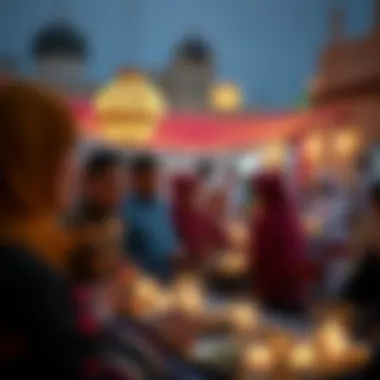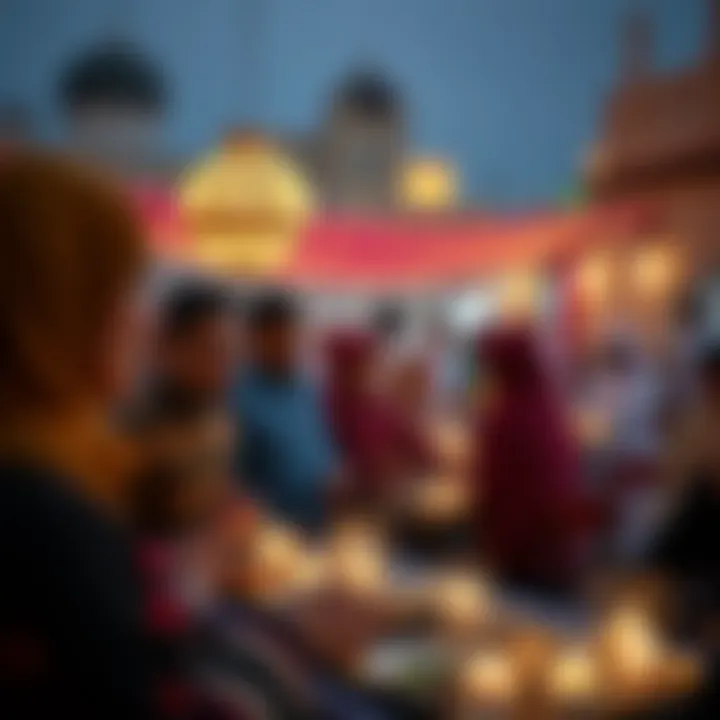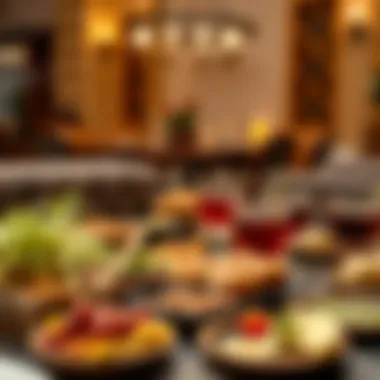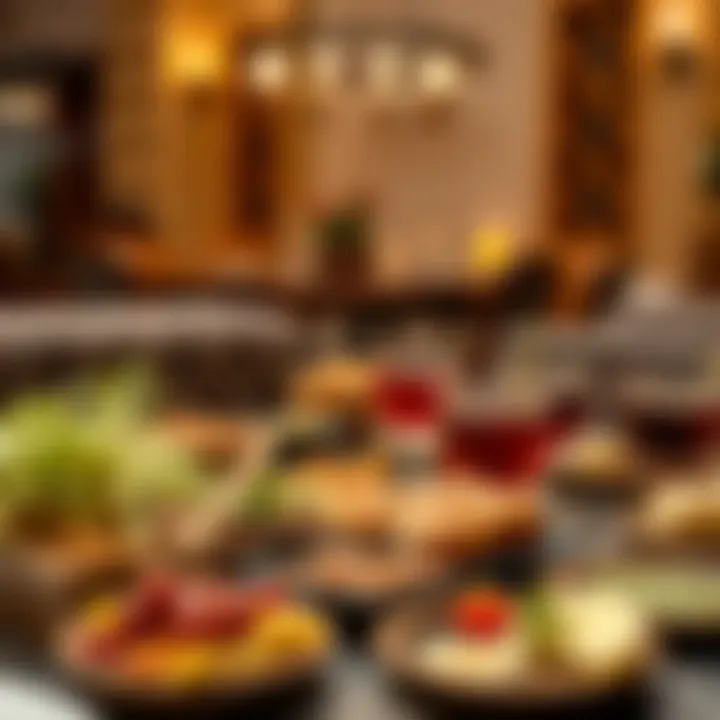Ramadan 2024 Iftar Timing and Cultural Insights


Intro
As the holy month of Ramadan approaches in 2024, communities around the world prepare for a period of fasting, spiritual reflection, and communal gatherings. Iftar, the meal breaking the daily fast, holds particular significance, symbolizing both a moment of personal connection with one's faith and a communal celebration of shared values and traditions. In bustling cities like Dubai, the landscape transforms, reflecting the dedication of its residents to honor this sacred time.
With the sun setting each day, the timing for Iftar varies, creating a dynamic environment where cultural practices and modern lifestyles converge. Understanding the specifics of Iftar times, influenced by geographical location and regional customs, is essential. This article aims to provide an in-depth examination of the Iftar timing during Ramadan 2024, the variations across different regions, and the implications these have on communities and real estate trends, particularly in Dubai.
As we explore these themes, we’ll touch upon trends in property investments, the evolving marketplace during the holy month, and how the sense of community is woven through Iftar gatherings. The insights provided here will be valuable not only for homebuyers, investors, and agents but also for anyone keen on understanding the intricacies of shared meals and memories during Ramadan.
Stay tuned for a detailed look into how this sacred month shapes lives, communities, and the very fabric of urban living.
Prologue to Ramadan Context
Ramadan, a month of profound significance for Muslims worldwide, transcends mere rituals. It embodies a holistic experience that intertwines faith, community, and self-discipline. Understanding Ramadan is crucial as it lays the groundwork for our exploration into the intricacies of Iftar, that cherished meal marking the end of the daily fast. The Islamic calendar is lunar, and in 2024, Ramadan is poised to begin on March 10, depending on the sighting of the moon.
By diving into the importance of this holy month, the readers gain insight into how fasting fosters empathy, self-restraint, and a closer bond with the divine. The act of fasting is not only about abstaining from food and drink from dawn until dusk; it’s a chance for reflection, spiritual growth, and a strengthened sense of community. Each evening, families and friends gather to share Iftar, a moment where the day’s struggles are put aside to celebrate unity and gratitude.
Moreover, knowing the context of Ramadan enriches our understanding of Iftar’s significance. It is not merely about breaking the fast; it's an event saturated with cultural expressions, culinary specialties, and communal values. This preparation to embrace Iftar is steeped in anticipation, as diverse culinary practices flourish and individuals express their hospitality and generosity.
In summary, grasping the context of Ramadan allows readers — be they homebuyers seeking a sense of community, expats wanting to blend into the culture, or investors focusing on related economic opportunities — to appreciate the essence of Iftar and its broader implications. As we delve deeper, we will explore understanding Ramadan further.
Understanding Ramadan
During this sacred month, Muslims dedicate themselves to fasting, prayer, reflection, and community involvement. The fast begins at dawn and continues until sunset, and it's a time when individuals seek to detoxify not just their bodies but also their souls. Many believe that fasting teaches humility and gratitude; after all, experiencing hunger for a brief period helps one appreciate the abundance they might otherwise take for granted.
A unique aspect of Ramadan is the way it encourages communal identities. Mosques often host nightly prayers called Tarawih, and communities gather in homes or public spaces to break fasts. This embodies the spirit of togetherness that permeates the month. Each evening, the fast concludes with the call to prayer, marking the moment for Iftar.
The Essence of Fasting
Fasting during Ramadan is about more than physical deprivation; it's deeply symbolic. The essence of fasting is profoundly rooted in the principles of self-control, purification, and mindfulness. By resisting temptations, adherents learn to focus on spiritual growth and ethical living.
For many, this period of fasting serves as a reminder of the plight of those less fortunate. The act prompts individuals to cultivate compassion, leading many to engage in charitable acts to support their communities. This profound humanitarian angle tied to fasting not only enriches the giver but revives community spirits and strengthens bonds.
This essence around fasting molds the very context from which the Iftar emerges. As the mosques echo with the call to prayer, throngs gather, and the table is set for shared plates of food — thus marking a culmination of faith, discipline, and community. \n
"Fasting is not about mere abstinence; it's about nourishment of the soul, a call for gratitude, for peace, and for a greater awareness of our fellow beings."
Significance of Iftar
Iftar, the evening meal that breaks the fast during Ramadan, holds profound significance for Muslims around the world. It is not merely about eating after a long day of abstaining from food and drink; the practice encapsulates a rich tapestry of cultural, spiritual, and communal elements that enrich the experience of fasting. This article delves into these layers, illustrating how Iftar serves as a vital bridge connecting individuals, families, and communities while emphasizing the values inherent in this sacred tradition.
Cultural Importance
The cultural importance of Iftar can be understood through various lenses. Traditionally, Iftar marks the end of a day of fasting, but it also represents an opportunity for gatherings that foster community spirit. Families often prepare special dishes, reflecting local culinary traditions, that are served in convivial environments. In some areas, the break of the fast becomes a communal event, where whole neighborhoods come together to celebrate. Dubai, for instance, showcases a diverse array of Iftar traditions influenced by its multicultural population. The blending of flavors—from Emirati dishes like harees to global fare—stands testament to the city's welcoming nature.
Every evening, mosques often host large communal Iftars, encouraging everyone to partake regardless of their background. This ritual emphasizes inclusivity, reinforcing social bonds among family, friends, and even strangers. Not only is Iftar a moment of breaking bread but it is also an occasion for storytelling and sharing experiences, making it one of the most culturally rich practices during Ramadan.
Spiritual Dimensions
On a spiritual level, Iftar serves as a profound reminder of the values of gratitude and humility. As Muslims break their fast with a date and water—a practice rooted in the teachings of the Prophet Muhammad—the serene act represents a gratitude for the sustenance granted to them by Allah. This simple ritual invites individuals to reflect on their blessings, drawing attention to those who may not have regular access to food or clean water.
In addition, Iftar often acts as a catalyst for deeper introspection and community service. Many individuals use this time to engage in charitable acts, providing meals to the less fortunate. This serves as a powerful reminder of the social responsibility that comes with abundance, encouraging Muslims to give back, not just during Ramadan, but throughout the year.
Moreover, the act of gathering for Iftar is deeply spiritual. The evening prayers that follow serve to reconnect the participants with their faith and reinforce their commitment to community values, patience, and self-discipline gained during the fasting period. It transforms a mere meal into a celebration of unity—where thanks are given not only for food but for spiritual nourishment as well.
"The essence of Iftar transcends mere sustenance; it is an expression of gratitude, community, and faith intertwined."
In summary, understanding the significance of Iftar during Ramadan reveals the intricate blend of cultural and spiritual values that enrich the fasting experience. It is a means of fostering bonds that resonate well beyond the month itself. The shared meals, heartfelt prayers, and moments of giving encapsulate the holistic spirit of Ramadan, making Iftar a pivotal aspect of this holy month.
Iftar Timing for Ramadan
Iftar time holds a special place in the hearts of Muslims around the world. This moment signifies not only the end of a day of fasting but also a call to come together—whether with family, friends, or the broader community. Understanding Iftar timing for Ramadan 2024 is crucial because it frames the day's structure, guiding the rhythm of daily life during this sacred month.
As Ramadan approaches, knowing the exact timing for Iftar helps individuals plan their daily activities, from work schedules to family gatherings. Moreover, the precision around Iftar can enhance the spiritual experience of Ramadan, allowing for moments of reflection and gratitude as the sun sets and prayers are offered. It’s not just about when to break the fast; it’s about honoring traditions and fostering connections.
A well-synced Iftar time can also impact aspects beyond personal lives. From cultural observances to economic activities, it creates a unique flavor during the month. As the timing changes day by day due to the lunar calendar, the observance of Iftar becomes a dynamic element in the lives of those practicing it.
General Iftar Timing Guidelines
As Ramadan 2024 unfolds, Muslims around the world will rely on various methods to determine Iftar times in their locations. Here are some general guidelines that can be observed:
- Local Prayer Timetable: Most mosques and Islamic centers publish prayer schedules that include Iftar timings. These are typically based on the local sunset time.
- Islamic Apps: Many smart devices have applications that show prayer times, including Iftar timings, tailored to locations.
- Community Announcements: In many places, everyone partakes in Iftar at the time announced in their community. This fosters unity and collective participation.


Each individual may need to consider specific factors like geographical latitude, altitude, and local customs that might influence the sunset time. Some places may also adjust their times slightly for convenience, ensuring a smooth transition for those observing the fast.
Comparative Iftar Timings Across Regions
Iftar timings can vary significantly based on one’s geographical location. Different regions provide distinct experiences, and here’s how they compare:
- Middle East: Countries like Saudi Arabia and the UAE typically have Iftar at around 6:30 PM local time, coinciding closely with sunset hours. The warmth of family gatherings in these regions during Iftar acts as a cornerstone for community bonds.
- South Asia: In India and Pakistan, Iftar can occur anywhere from 6:45 PM to 7:15 PM. Food is often prepared ahead of time, with popular dishes ready to go as soon as the call to prayer beckons.
- North America: Cities like New York might see Iftar as late as 8:00 PM during the peak of summer months, which adds a unique aspect of planning due to extended daylight hours.
"In regions where the sun sets late, communities often adopt a 'break first, then pray' approach to accommodate the long fasting hours."
- Northern Europe: Countries such as Sweden can have Iftar timings exceptionally late, sometimes around 9:00 PM or beyond. This iteration tests the resilience and dedication of those observing the fast.
By understanding these variations, one can appreciate better how cultural and regional contexts shape the Iftar experience. It also emphasizes the flexibility and adaptability that come into play as communities navigate their fasting schedules throughout Ramadan.
Iftar Time Calculation Methods
Calculating the precise time for Iftar during Ramadan holds significant importance, not just for the devout, but also for communities, local businesses, and cultural celebrations. This method of calculation is deeply intertwined with religious principles, astronomical observations, and local practices that shape how families come together at sunset to break their fast. Understanding these methods helps enhance the experience of Ramadan, allowing everyone to partake in Iftar with mindfulness and respect.
Astronomical Calculations
Astronomy plays a fundamental role in the determination of Iftar. The timing is generally based on the sunset, which can shift daily. In many communities, mosques often use astronomical data to set the exact time for breaking fast. Utilizing this ancient science, they track the position of the sun relative to the horizon.
For instance, in cities like Dubai, which is located closer to the equator, the variation in sunset times throughout Ramadan can be quite pronounced. Depending on the day and climatic conditions, if you're one for details, the sun may set a few minutes earlier or later than previous days, calling for adjustments in our routines.
It is not just a matter of flipping a calendar, but rather paying close attention to lunar cycles and celestial movement. The Shia community often differs by starting their fast based on moon sightings rather than the traditional calculations. This introduces more local variances but ultimately aims at the same goal—synchronizing communal practices.
"For better planning and observance of Iftar, pursuing astronomical calculations aids both the community and individuals in staying aligned with religious observances while embracing scientific validation."
Local Observations
Local observations embrace a more community-centric approach in determining Iftar timings. In many neighborhoods, especially in diverse cities, people often gather to witness the setting sun together—a practice deeply rooted in community bonding. This aspect is not solely through physical sighting but can also incorporate the guidance from local Imams or community leaders.
Variances also arise from geographic factors such as elevation and urban landscape. In cityscapes filled with skyscrapers, it might be different for someone standing at ground level vs. those in elevated spaces, causing them to note the sunset distinctly. This real-life angle reflects the communal essence of Ramadan, bringing families together as they wait for the sun to dip below the horizon.
Timing can also be influenced by cultural preferences, as certain families might prioritize gathering over exact timing, choosing to break fast when they collectively agree that it feels right based on their local environment. Making the timing personal underscores the value of relationships and shared experience.
Iftar Practices Variations
The cultural mosaic that Ramadan celebrates is reflected vividly in the diverse Iftar practices observed around the world. Understanding these variations is essential, as they encapsulate the heartfelt emotions, community bonding, and culinary traditions tied to the breaking of fast. This section examines the richness and intricacies of Iftar practices, highlighting both communal and personal elements, benefits, and considerations that make each practice unique.
Community Gatherings
During Ramadan, the call to gather for Iftar echoes across neighborhoods, creating a sense of unity. Community gatherings transform the act of breaking fast into a collective experience. Families, friends, and often strangers come together, sharing dishes and stories. These settings can range from large public events in parks to intimate gatherings held in homes. Here’s why such community interactions matter:
- Strengthening Social Ties: Engaging in a communal Iftar fosters deeper connections. When people come together to share food, they also share experiences and emotions.
- Encouraging Inclusivity: Public Iftar events often welcome everyone, regardless of their background. This openness promotes understanding and solidarity among diverse groups.
- Cultural Identity: Local flavors and traditional dishes define these gatherings, creating a rich cultural exchange. Each dish tells a story, uniting generations through food.
In many cities, especially in Dubai, local authorities and communities host mega-Iftar events, inviting both residents and visitors to partake in the feast. These events emphasize sharing and celebrating as much as they do nourishment.
Home Iftar Traditions
Home Iftar traditions often reflect personal and family histories, handed down through generations. The way each family observes Iftar can reveal a lot about their cultural background, values, and traditions. Some common elements include:
- Signature Dishes: Families usually have special recipes that have been passed down. For instance, in a Syrian household, you might find lentil soup and baked goods, while a Pakistani family may prepare biryani and samosas.
- Rituals: Many families begin their meal with dates and water, following the tradition of the Prophet Muhammad. This beautiful ritual sets a solemn yet joyous tone for the meal.
- Family Dynamics: Home Iftars are as much about food as they are about togetherness. Extended families often gather, bringing life to shared stories and laughter around the dinner table.
Ultimately, Iftar at home serves as a sanctuary where the fast is broken with gratitude and reflection. It allows for individual expressions while simultaneously tying back to broader family legacies.
As Ramadan unfolds, the act of gathering for Iftar stands as a testament to the strength and diversity of community bonds, whether in a crowded public space or a cozy family setting. The blend of practices observed across cultures not only enriches the experience but also contributes to a profound sense of belonging during this sacred month.
The Role of Iftar in Dubai's Cultural Landscape
Iftar in Dubai is much more than just a meal to break the fast. It stands as a vibrant symbol of community, tradition, and rich cultural tapestry that defines the city. During Ramadan, the essence of Iftar brings people together from various walks of life, highlighting the harmonious coexistence that Dubai is known for. The significance of Iftar in this cosmopolitan hub transcends mere sustenance, offering a glimpse into the local customs that shape its cultural identity.
Local Customary Foods
One of the most delightful aspects of Iftar in Dubai is the array of customary foods that grace the dining tables. Traditional dishes are not merely food; they represent history, tradition, and familial connections. Some beloved local items include:
- Dates: These are the quintessential start to any Iftar meal, symbolizing abundance and hospitality. The sweetness of dates, often paired with Arabic coffee, is a must-have, making the experience both tactile and flavorful.
- Luqaimat: These deep-fried dumplings are drizzled with syrup. Crunchy on the outside yet soft on the inside, they're a favorite among many and are often served during festive occasions.
- Samboosa: These are savory pastries stuffed with a variety of fillings, ranging from spiced potatoes to minced meat. Crispy and satisfying, they make for perfect appetizers at any Iftar gathering.
- Shorbat adas: Lentil soup is a staple across many meals and serves as a warm comfort dish, particularly during the cooler evenings of Ramadan.
The variety of dishes reflects a blend of Middle Eastern and South Asian influences, attributing Dubai’s multicultural makeup. Families often come together, each bringing their specialty to share, thus enhancing community bonds and ensuring a richer tasting experience) (a nod to communal spirit).
Culinary Events and Festivals
The gastronomic scene in Dubai truly flourishes during Ramadan, with numerous culinary events and festivals cropping up throughout the city. These gatherings spotlight the vibrancy of Iftar in communal settings, supporting local businesses and chefs. Notably, notable happenings include:


- Ramadan Night Markets: These markets pop up across various districts, offering family-friendly activities, local delicacies, and unique experiences. Here, one can find pop-up restaurants and food stalls showcasing local favorites and international cuisines.
- Iftar Buffets at Hotels: Renowned hotels launch spectacular buffets, featuring a rich variety of local and international dishes. Many establishments, like the Burj Al Arab, offer extravagant dining experiences designed to attract residents and visitors alike.
- Community Iftars: Local governments and organizations often sponsor large community gatherings, offering free Iftar meals to those in need. This practice fosters generosity and inclusivity, creating spaces for people from different backgrounds to connect.
“Iftar in Dubai encapsulates more than just breaking the fast; it serves as a platform for unity, tradition, and innovation,” says a local chef renowned for his culinary expertise.
Through these events, the culinary landscape not only retains traditional practices but also embraces innovation and creativity, drawing food lovers into a vast array of flavors and experiences.
This cultural canvas painted with cherished traditions and modern influences makes Iftar in Dubai a cornerstone of the community, uniting people during the spiritually significant month of Ramadan.
Economic Impact of Ramadan and Iftar
The economic ramifications of Ramadan and the accompanying Iftar are deeply woven into the fabric of many communities, particularly in regions with a significant Muslim population. This section aims to unravel how this period of fasting not only shapes spiritual lives but also fuels economy through a surge in consumer activity and investment, affecting various sectors from food and retail to hospitality and real estate.
Market Demand Trends
As Ramadan approaches, an observable fluctuation in market demand emerges. Businesses often experience a sharp increase in sales, particularly in sectors like food, retail, and logistics, as families prepare to break their fast with sumptuous meals at Iftar. For instance, demand for traditional foods ramp up, leading to increased inventory purchases in local markets and stores. The traditional dates, which are among the first foods Muslims consume to end their fast, see a notable hike in price and sales volume leading up to Ramadan.
Additionally, restaurants and cafes expand their offerings to accommodate the influx of customers looking to enjoy communal Iftar meals. Special combos and family meal promotions appear like clockwork during this time, catering to families and groups gathering together. The overall spending on food and related services can rise significantly.
Observations include:
- Date Sales: Prices skyrocket as they become sought after for breaking fast, benefiting both local producers and importers.
- Restaurant Business: Many eateries report up to a 50% increase in sales during the evenings compared to outside of Ramadan.
- Grocery Stores: Expect higher footfall as families stock up on essential goods to prepare for nightly feasts.
Investments in Hospitality Sector
The hospitality sector reaps considerable rewards during Ramadan, fueled by both the local populace and expatriate communities. Hotels and resorts often introduce special Ramadan packages that include lavish Iftar buffets and Sahur (pre-dawn meal) options aimed at both staycationers and travelers. This tactical move not only enhances guest experiences but also maximizes occupancy rates across the holy month.
In cities like Dubai, where the convergence of traditional and modern dining experiences is celebrated, establishments compete to offer unique Iftar experiences. This adds another layer to the already dynamic environment of the hospitality industry. Many investors view this as an opportunity to reinvest profits from previous years into making their offerings even more attractive.
Examples of such adaptations can include:
- Enhanced Services: Hotels staffing up to meet demand with tailored menu offerings and cultural events.
- Collaborations: Partnerships between local artisans and restaurants to showcase traditional meals, thereby promoting cultural heritage as well as generating profit.
Ultimately, Ramadan serves as a crucial period for economic commerce, highlighting the significance of Iftar as more than a meal; it is a catalyst for community building, connectivity, and economic growth. As we reflect on the profound impact of these practices, it is clear that Ramadan is not just about fasting but is a vibrant economic engine that supports livelihoods and local businesses long after the last dates are consumed.
Real Estate Implications During Ramadan
The month of Ramadan brings with it not only a time for devotion and reflection but also significant real estate implications. It stands out as a period where an increase in community activities, more transient populations, and specific space requirements reshape the dynamics of the real estate market. Whether it's homes being rented to accommodate visitors or businesses adjusting their spaces for Iftar gatherings, understanding these shifts is crucial for homebuyers, investors, and agents alike.
Ramadan influences both the residential and commercial real estate sectors in various ways. As families gather to break their fast together, the demand for living spaces might spike, particularly in areas close to mosques or community centers. The multifaceted nature of these real estate implications is not just limited to the demand for housing but also extends to how and where businesses operate to cater to the unique needs of this month.
Temporary Housing Opportunities
As many people travel to be with family during Ramadan, there arises a notable demand for temporary housing options. This can involve short-term rentals or serviced apartments. For homeowners or investors, capitalizing on this transient demand can be economically rewarding.
In cities like Dubai, where expatriates make a significant portion of the population, hosting relatives or friends during Iftar is quite common. This leads to the need for flexible housing arrangements. Here are some key factors to consider:
- Rental Rates Fluctuation: As demand increases, rental rates may observe a slight lift, making it a great time for landlords to temporarily adjust pricing.
- Short-term Rentals: Websites like Airbnb see spikes in bookings during this period, reflecting a shift in interests towards community-centric opportunities.
- Local Regulations: Familiarizing oneself with local housing regulations becomes imperative. Adhering to laws governing short-term rentals will prevent potential legal issues.
Home buyers looking for investment opportunities during this time should also explore neighborhoods that tend to draw more visitors, ensuring a potentially higher return on investments.
Commercial Space Adaptations
Braiding the essence of Ramadan with business operations, the adaptation of commercial spaces demands strategic recalibrations. Many establishments modify their hours, ambiance, and offerings to align with the values and rituals of this sacred month.
Consider the following:
- Extended Hours of Operation: Restaurants often extend their hours to cater to late-night diners seeking meals post-Iftar, which can lead to a notable increase in foot traffic.
- Community Events and Promotions: Businesses might choose to host special Iftar events or themed nights that draw in customers, thus highlighting the intersection of commercial objectives and community spirit.
- Space Reconfiguration: Retailers and eateries may repurpose their spatial arrangements to accommodate larger gatherings, thus requiring a deeper understanding of customer capacities and comfort levels during this bustling month.
Overall, Ramadan prompts a shift in how businesses plan their space to meet the communal needs, which can lead to opportunities for property owners looking to optimize usage and improve customer engagement.
“Understanding the real estate implications of Ramadan helps stakeholders navigate this unique period with clarity and purpose.”
As such, whether one has a keen eye on the market for investment or is considering adjustments for personal endeavors, recognizing seasonal shifts like those during Ramadan can lead to insightful decisions.
Social Dynamics During Ramadan
Ramadan is not just a month of fasting but a time that nurtures social dynamics within communities. This period encourages interactions among family, friends, and neighbors. Iftar, the meal to break the fast, becomes a central event where these social interactions flourish. It emphasizes shared moments, enhancing feelings of goodwill and mutual support among individuals.
The significance of these social dynamics lies in its ability to strengthen community bonds. People gather, sharing experiences and meals, which fosters a sense of belonging. During Ramadan, both the spiritual and social elements blend seamlessly, contributing to a rich tapestry of cultural heritage. People often prepare large feasts, inviting others to their homes, and creating a welcoming atmosphere. This practice not only solidifies existing friendships but often leads to the formation of new ones, reinforcing the idea that togetherness is fundamental during this sacred time.
Strengthening Community Bonds
One of the most noticeable aspects of Ramadan is how it brings communities together. Neighbors may engage more frequently, exchanging not just food but stories and traditions. In many regions, communal Iftar meals are organized in public spaces, allowing for diverse groups to connect over shared values.


These gatherings often include elements like:
- Shared Meals: Many families contribute dishes, enhancing the variety of food and symbolizing unity.
- Cultural Celebrations: Various traditions are showcased, highlighting the uniqueness of different cultures within the Ramadan framework.
- Intergenerational Exchange: Elders pass down stories and practices to younger generations, ensuring that the essence of Ramadan endures and evolves.
The bonds formed during this month can have lasting effects, extending into the rest of the year. They foster friendships that strengthen community resilience amidst challenges.
Encouraging Charity and Generosity
Ramadan is also a time of giving. The emphasis on charity during this period pushes individuals to reflect on their responsibilities towards those less fortunate. It transforms the act of breaking a fast into a collective act of kindness. Not only do individuals share their meals, but they also engage in acts of generosity that resonate within their communities.
Charity during Ramadan includes:
- Zakat and Sadaqah: While Zakat is a mandatory act, many individuals give Sadaqah—voluntary charity—throughout the month, aiming to support various community needs.
- Food Drives: Many organizations collect donations for those in need, ensuring that everyone has access to Iftar.
- Volunteer Initiatives: Community members often rally together to serve meals to the homeless or less privileged groups, further emphasizing social responsibility.
Here, it is vital to consider that charity during Ramadan doesn’t solely focus on financial contributions. It can be as simple as sharing knowledge, providing emotional support, or lending a helping hand.
"Ramadan teaches not just fasting, but the art of giving, unselfishly connecting with others in our community."
In essence, the social dynamics during Ramadan highlight the importance of community. They pave the way for dialogues, inclusivity, and understanding among diverse populations, creating a sense of togetherness that can flourish long beyond the month.
Iftar as a Global Phenomenon
Iftar is not merely a meal that marks the end of a day's fasting; it's a cultural tapestry woven through the lives of Muslims worldwide. As the sun sets during Ramadan, millions come together to break their fast, transforming this moment into a celebration of community, spirituality, and tradition. In this section, we explore the essence of iftar as a global phenomenon, and how it shapes and reflects the varied experiences of Muslim communities around the world.
One primary aspect to highlight is the diversity of practices that characterize iftar across different nations. From the spicy samosas in Pakistan to the sweet dates traditionally consumed in the Middle East, every culture brings its own unique flavor and dishes to the table.
- In Indonesia, one may find a staple of fried bananas and Kolak, a sweet dessert made from bananas, sweet potatoes, and coconut milk.
- Egypt offers Koshari, a mix of rice, lentils, and pasta, often topped with zesty tomato sauce.
- In Turkey, iftar is incomplete without Pide, a Turkish bread often served with delicious meats or cheeses.
This culinary diversity is a microcosm of local customs and histories, reflecting how iftar serves as a cultural bridge. It encourages not just family gatherings, but communal feasting with friends and neighbors, emphasizing the importance of unity and connection during Ramadan.
"The beauty of iftar lies in its power to draw people closer, breaking barriers through shared meals and stories."
Variations Across Muslim Countries
When examining the variations of iftar in Muslim countries, it’s crucial to recognize that factors like geography, history, and even climate significantly influence what is served and how the meal is celebrated. For example, in Gulf countries, the customary dates are often complemented by rich dishes, which reflect their affluent culture and trading history.
Meanwhile, in Central Asian nations, traditional dishes may lean heavily on hearty ingredients, as seen in Plov, a rice dish often served with meat and vegetables. The colder climate influences these cultures to favor warm, comforting foods that foster a sense of warmth and community.
Additionally, Islamic traditions manifest differently. In some places, iftar might be a large communal event in mosques, fostering a sense of unity among worshipers, while in others, it could be a modest affair within the family home.
- In Malaysia, breaking fast is a vibrant community event, where Bazaars pop up offering myriad choices.
- Meanwhile, in Morocco, Harira, a rich soup, is served as a traditional opener for the meal, showcasing local ingredients and culinary techniques.
Iftar in Non-Muslim Majority Countries
In non-Muslim majority countries, iftar takes on additional layers of meaning. It often serves as a means to share and explain Islamic traditions to those outside of the faith. Many Muslims in countries like the United States, Canada, and Australia engage their local communities by inviting neighbors to join for iftar, promoting understanding and tolerance.
During this time, public celebrations may also take place, facilitated by local mosques or community centers, providing a platform for discourse and interaction. Here, iftar embodies bridging cultural divides.
- In Canada, Ramadan dinners are often organized to promote interfaith dialogue, where people of different backgrounds come together to break bread, enhancing community ties.
- In Australia, iftar events are sometimes held in parks or public spaces, where both Muslims and non-Muslim friends gather, showcasing an inclusive spirit.
Celebrating iftar in these contexts also emphasizes resilience, as Muslims often adapt their traditions while honoring the sanctity of Ramadan within a multicultural framework.
In summary, iftar’s significance transcends mere sustenance; it is a celebration of life, faith, and shared humanity, knitting together the diverse experiences of Muslims around the world while inviting the broader community to partake in the spirit of Ramadan.
Closure and Reflections
The discussion surrounding Iftar extends beyond merely breaking the fast. It encapsulates a rich tapestry of traditions, community, and spirituality that define the holy month of Ramadan. In this article, we dissected various dimensions of Iftar, aiming to provide clarity and depth to this vital aspect.
Understanding the significance of Iftar serves a dual purpose: it connects individuals to their cultural heritage and embodies the principles of community and togetherness. The gatherings around Iftar tables represent not just the culmination of a day's fast, but also an opportunity to reinforce social ties, nurture relationships, and reflect on personal growth during the month. For homebuyers and investors, grasping the essence of Iftar is fundamental. It aids in comprehending the lifestyle of local communities and can greatly influence real estate decisions and market trends.
The broader implications of Iftar touch upon economic factors too. Restaurants, hotels, and catering businesses see a significant uptick in activity during Ramadan evenings. This period of high demand tells a story of how cultural practices intertwine with economic growth, which is a pertinent consideration for analysts and investors alike.
Furthermore, as we’ve traced the various practices surrounding Iftar—be it the specific foods enjoyed across cultures or the unique local customs that flourish—it becomes clear that each region brings a unique flavor to this shared experience.
The Lasting Impact of Iftar
Iftar creates ripples that extend far beyond its immediate moment, echoing in the lives of individuals and the fabric of society. Each evening spent sharing food with loved ones underlines the importance of generosity and gratitude during Ramadan. The collective experience fosters unity, reminding us that despite the diverse backgrounds and stories each person carries, the act of breaking bread transcends borders. In places like Dubai, this act holds cultural significance, blending tradition with modernity, thus nurturing a harmonious coexistence.
"Feeding a fasting person is a noble act that carries immense blessings across cultures."
Beyond the spiritual dimensions, Iftar serves as a reminder to practice tolerance and understanding, making it a time to open one’s heart and home to those in need. Whether it’s inviting family over or participating in community initiatives, the impact of Iftar reverberates, imbuing a sense of purpose. Schools, workplaces, and even informal gatherings reflect this ethos by promoting acts of kindness and sharing.
Looking Ahead to Future Ramadans
As we look to the future, the evolution of Iftar and how it's observed can serve as a lens through which we can assess changing societal norms. With advancements in technology and growing global interconnectedness, the ways in which communities engage during Ramadan are bound to transform. The essence of Iftar, however, must remain rooted in its core values—community spirit, reflection, and shared experience.
Changes in lifestyle trends, such as the growing demand for healthy eating, indicate that Iftar menus may adapt to meet new dietary preferences while retaining traditional favorites— a blend of the old and the new, essential in today's fast-paced life. This adaptability matters for those investing in hospitality sectors.
Looking forward, there's also a promise of greater emphasis on inclusivity, especially in multicultural hubs like Dubai. People from various backgrounds might add their flavor to Iftar traditions, enriching the already diverse practices. For homebuyers, the forward-thinking approach could signal a growing potential for properties that cater to diverse community needs.







